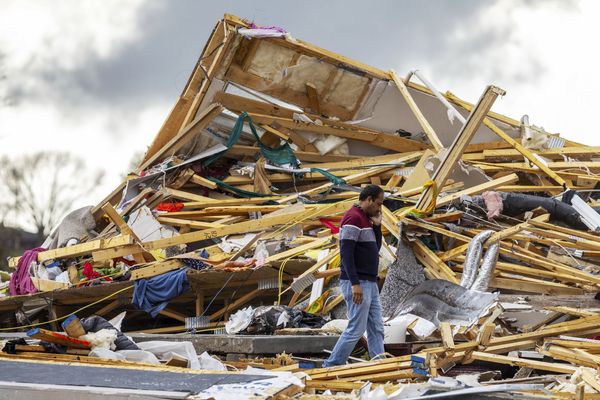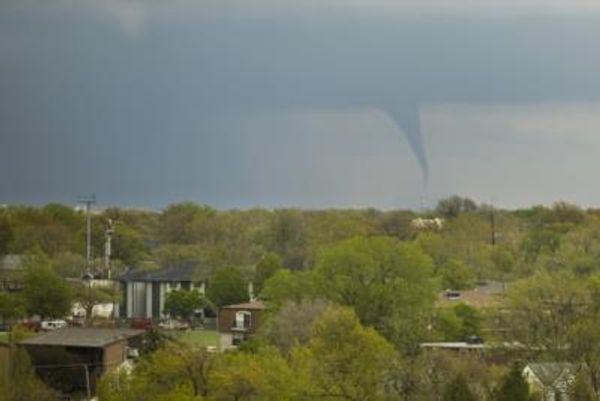
Violent thunderstorms with winds of up to 139mph (224km/h) have struck the Mediterranean island of Corsica and parts of Italy, killing seven people and leaving at least a dozen more injured.
On Corsica, a 13-year-old girl died after a tree fell on a campsite where she was staying in the south, while a 46-year-old man was killed when a tree fell on a campsite bungalow in the northern town of Calvi. A 72-year-old died when the roof of a beach hut was blown off and struck her car.
Two people were killed in separate incidents in Tuscany when trees were ripped up by storms on Thursday – one near the city of Lucca and another near Carrara. Another four people were injured by falling trees at a campsite near Carrara.
In Venice, hurricane-force winds ripped away shards of brick from St Mark’s bell tower.
The Meteo France weather service issued another severe weather alert for Corsica, but said it “expected wind gusts with storms overnight to Friday will be much less violent than those on Thursday morning”.
The storms struck after three days of intense rain in the region, which has endured a summer of extreme heat, drought and raging forest fires that scientists have linked to human-caused climate change.
Officials ordered the evacuation of all campsites on Corsica and rescue operations were launched along the island’s western coast in response to SOS calls from grounded and wrecked ships. Dozens of other vessels sent out signals requesting emergency help.
Rescue crews found the bodies of a 62-year-old fisher and an unidentified kayaker off Corsica’s west and east coasts, according to the French maritime authority for the Mediterranean. It said both died as a result of the sudden storm and that more than 100 grounded, wrecked or stranded ships in the area had called for emergency help.
On Corsica about 45,000 homes were left without electricity on Thursday and at least 12 people were injured and taken to hospital, one in a critical condition, the island authorities said.
The French president, Emmanuel Macron, said he had called an emergency government meeting by video conference on Thursday evening to respond to the crisis.
The interior minister, Gérald Darmanin, travelled to the island on Thursday and visited the worst-affected areas including the campsites where people died. He said that at one point about 350 people had been reported missing as pleasure boats had capsized or been thrown adrift, but that they had now all been found alive and well.
The president of the executive council of Corsica, Gilles Simeoni, described a brief but “extremely violent and entirely unpredictable” weather event that lasted “dozens of minutes”.
In Venice, high winds detached pieces of brick from St Mark’s bell tower, which stands in front of the famed cathedral. Tourists were evacuated from the structure, which was cordoned off. The storm upended chairs and tables in St Mark’s Square and elsewhere, and swept away beach chairs on the nearby Lido.
Winds rose suddenly and were calmed within five minutes, said Carlo Alberto Tesserin, the caretaker of the basilica and bell tower. “These were not usual winds for us,” Tesserin told the Associated Press.
Cedric Boell, the manager of restaurant Les Gones Corses in northern Corsica, said: “We have never seen such huge storms as this, you would think it was a tropical storm.”
Yolhan Niveau, 24, a wildlife photographer staying at a Corsican campsite near San-Nicolao in the north-east, said the storm had torn through the site, uprooting trees and damaging mobile homes. “There was no warning. ... I don’t feel scared just stupefaction. No one expected this.”
Meteo France had not given advance warning and said the exact location of storms was hard to predict. It issued an alert with “immediate effect” as strong winds began to hit the island.
In northern Italy, an overnight storm forced the closure of a rail line south-east of Genoa after high winds carried beach structures on to the tracks, damaging the electrical circuitry.
The storm struck during Italy’s busiest beach vacation week. The mayor of Sestri Levante, Valentina Ghio, warned that whirlwinds were possible and appealed to visitors to stay away from beaches until the severe weather had passed.
Hailstones the size of walnuts pounded Italy’s Liguria region with enough force to break windows and damage orchards and gardens.
While northern Italy has suffered its worst drought in decades this year, heavy rains in recent days that brought scattered hailstorms, whirlwinds and flooding have damaged or destroyed entire crops of fruits and vegetables along with vineyards and olive orchards, according to the Italian agricultural lobby Coldiretti.
On Wednesday, sudden thunderstorms caused flash floods in Paris subway stations and the Old Port of Marseille. The previous day winds of more than 60mph (100km/h)were recorded at the top of the Eiffel Tower.







